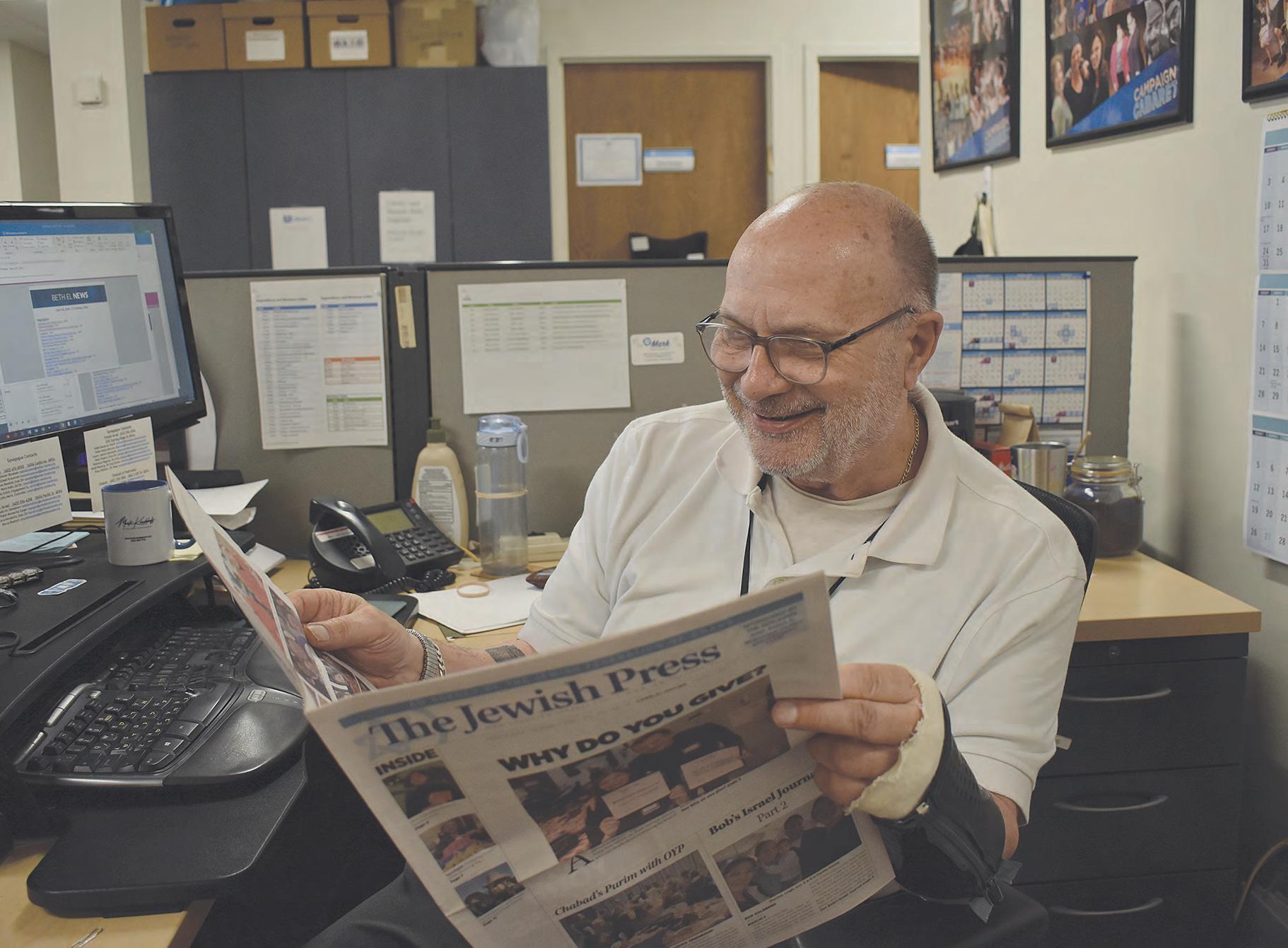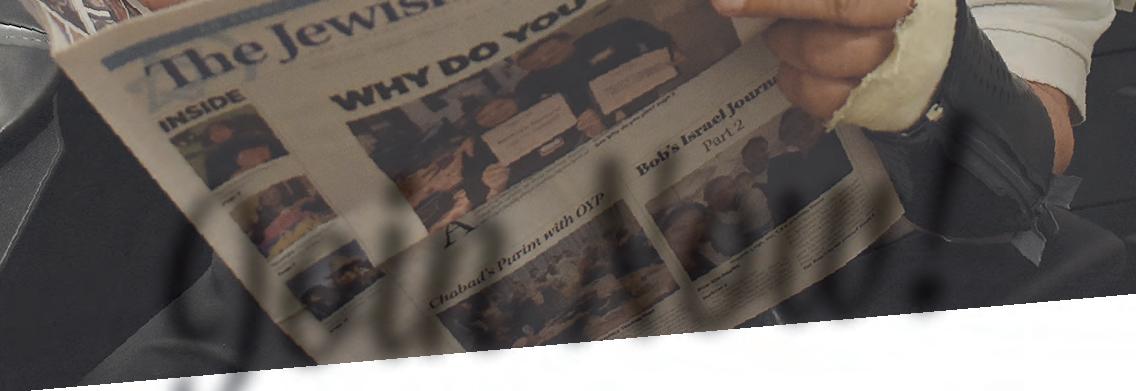






MARY SUE GROSSMAN
Since the 1880’s, there has been an Orthodox community in Omaha.
Beth Hamedrosh Hagadol (BHH), otherwise known as “The Litvsche Shul,” was the first, in 1883. Over the next few years, other small synagogues were formed, including B’nai Israel Adas Russia (better known as “The Kippler Shul”), B’nai Jacob Anshe Sholom (“The Kapulier Shul”), and Beth Hamedrash Adas Yeshurun. After several years, Bnai Jacob Anshe Sholom and Beth Hamedrosh Adas Yeshurun merged to form B’nai Jacob Adas Yeshurun and retained the moniker of “The Kapulier Shul.”

Eventually, B’nai Israel (the “Kippler Shul”) and BHH (the Litvsche Shul”) merged to form the Union of Orthodox Congregations of Omaha. Several years later, in the mid-40s, it was decided to move forward in building a new synagogue and an architect was hired to design a new building. At the same time, the congregation selected a new name: Beth Israel Synagogue.
LINDA POLLARD
It is now three quarters of a century later and in celebration of its 75th anniversary, Beth Israel will hold its annual tribute dinner on Sunday, Sept. 15, 2024 Milestones – A Celebration of Beth Israel will share a look at seven-plus decades of history and memories. “75 years is a landmark in any organization,” shared Howard Kutler, a member of the Milestones Committee. “So many in Omaha’s Jewish community have strong ties to Beth Israel, be it Hebrew School, B’nai Mitzvot, weddings, youth and holiday activities plus countless other activities and events. This is a great way to share those memories and be a part of Beth Israel’s continuing history.” In commemoration of Beth Israel’s history, the evening will also include the dedication of the Beth Israel Chapel/Beit Midrash, recognizing two individuals who were key to the strength of the synagogue: Rabbi Isaac Nadoff and Cantor Leo Fettman, both of blessed memory. Long time clergy members, they were synonymous with Beth Israel and honoring them is a fitting recognition
See Beth Israel: Milestones page 2
JFO Foundation Endowment
Assistant/Staff Writer
The Foundation’s mission is to ensure the ongoing and future sustainability of Jewish Omaha by managing donor assets and distributing funds. These funds are instrumental in providing support for scholarships, grants, special projects, programs that benefit both Jewish Omaha and secular and Jewish charitable organizations near and far chosen by our donor-advised participants. Your support enriches Jewish Tomorrows. We take great pride in our dedicated board members, each of whom plays a vital role in advancing our mission. Throughout the year, we will be spot-
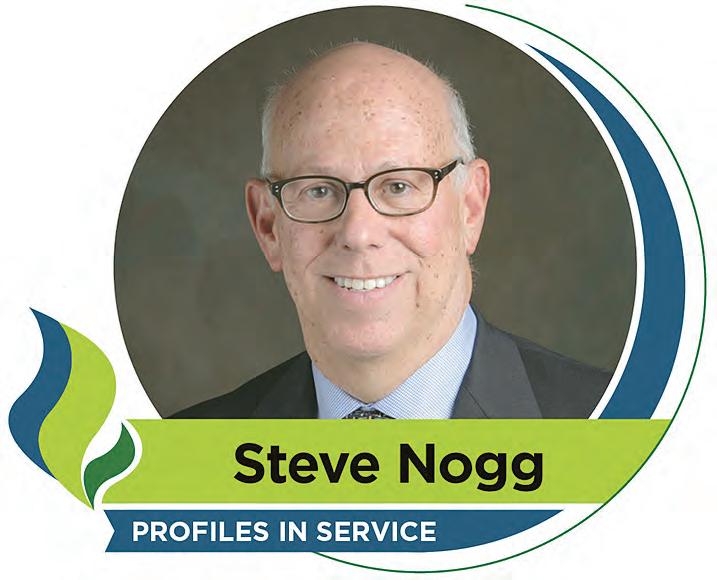
lighting members to recognize their valuable time, talents, and contributions to making our community stronger.
STEVE NOGG has served on The Foundation board since 2013. What attracted you to be on The Foundation Board?
In 2004 Marty Ricks, Executive Director of The Foundation took me to
lunch and educated me on The Foundation and its many benefits. Through that time with Marty, I became involved and have now been on the Foundation Board for 10 years. What about being on The Foundation Board inspires you? I enjoy the dialogue we have on the See Profiles in Service page 2











Book 1:
Bubby Karp is no ordinary detective. Most of the time, she’s just proud to be the bubby of Nechama, Naftali, Eli, and Ezra. But whenever something strange happens in Spring Hill, she and her grandkids are hot on the trail.
Join Bubby Karp and the kids as they search for a priceless violin, unmask an impostor, catch a counterfeiter, and much more. There’s never a dull moment in Spring Hill.
Book 2:
Bubby’s back with more fun and adventure! Join Bubby Karp and the kids as they search for disappearing trees, seek the source of mysterious smells, try to catch a cheating chef, and much more. Bubby Karp, the clever, energetic, fun-loving, senior detective of Spring Hill, is back solving mysteries with her grandchildren Nechama, Naftali, Eli, and Ezra. Whenever something unusual is happening, you can count on Bubby Karp to figure it out.
Book 3:
When Bubby Karp brings her grandchildren to the small beach town of Oceanview for the summer, they soon discover there is more going on than just fun in the sun. The town is home to many unsolved mysteries. With the help of some new friends, Bubby Karp and her grandchildren try to find a missing cow, catch some fishy fishermen, stop a sand thief, and much more. The clever, energetic, fun-loving senior detective you know and love is back.
Count on Bubby Karp, Nechama, Naftali, Eli and Ezra for more exciting adventures.
See Kripke-Veret page 2
Continued from page 1
of their dedication to Beth Israel and the Omaha Jewish community. Several Nadoff and Fettman family members will be in attendance.
“Rabbi Nadoff and Cantor Fettman were power houses for Beth Israel,” shares committee member Bruce Potash. “I cannot imagine the number of lives they influenced in both the Jewish and general communities in Omaha. They were excellent teachers and strong leaders and their impact simply cannot be measured,” Bruce continued. “Dedicating the chapel/Beit Midrash in their memory shows Beth Israel’s commitment to one of their highest ideals, those of learning and teaching.”
“To be a part of Beth Israel’s 75 years is such an honor for me,” said Rabbi Ari Dembitzer.
“During the years I have been in Omaha, there have been countless people who have told me stories of growing up at Beth Israel, shared special memories of Rabbi Nadoff, or told me a joke they first heard from Cantor Fettman These are just a few examples of l’dor v’dor, from generation to generation, that have made Beth Israel strong. I hope every-
one will be a part of our celebration and help Beth Israel continue for many generations to come.”
Another highlight of the evening will be the presentation of the Beth Israel Synagogue Lifetime Achievement Award to Nancy Mattly. Nancy retired last year after working as Beth Israel’s caterer for over 30 years, providing delicious meals for kiddushes, Shabbat dinners, holiday lunches and dinners, and many special events. In addition, she has been a wonderful friend to the congregation.
Additional details of the Sept. 15 event will be shared in the coming weeks and community members are asked to “save the date” on their calendars and plan to be a part of a unique celebration of Beth Israel. People are also encouraged to share their memories by contacting Howard, Bruce, Helene Shrago, Bette Kozlen, Ron Giller, Nancy Wolf, Sarah Abrahamson, Karen Cohen, Rabbi Mordechai Geiger, or Mary Sue Grossman.
To receive Beth Israel’s weekly email and stay up-to-date on all synagogue happenings, please call the office at 402.556.6288 or email bethisrael@ orthodoxomaha.org
The award-winning B’NAI B’RITH BREADBREAKERS speaker program currently meets Wednesdays via Zoom from noon to 1 p.m. Please watch our email for specific information concerning its thought-provoking, informative list of speakers. To be placed on the email list, contact Breadbreakers chair at gary.javitch@gmail.com ORGANIZATIONS

Continued from page 1 ADULT:
Künstler in Paradise by Cathleen Schine
For years Mamie Künstler, ninety-three-years-old, as clever and glamorous as ever, has lived happily in her bungalow in Venice, California with her inscrutable housekeeper and her gigantic St. Bernard dog. Their tranquility is upended when Mamie’s grandson, Julian, arrives from New York City. Like many a twenty-something, he has come to seek his fortune in Hollywood. But it is 2020, the global pandemic sweeps in, and Julian’s short visit suddenly has no end in sight.


Mamie was only eleven when the Kün-
stlers escaped Vienna in 1939. They made their way, stunned and overwhelmed, to sunny, surreal Los Angeles where they joined a colony of distinguished Jewish musicians, writers and intellectuals also escaping Hitler. Now, faced with months of lockdown and a willing listener, Mamie begins to tell Julian the buried stories of her early years in Los Angeles: her escapades with eminent émigrés like Arnold Schoenberg, Christopher Isherwood, Thomas Mann. Oh, and Greta Garbo.
While the pandemic cuts Julian off from the life he knows, Mamie’s tales open up a world of lives that came before him. They reveal to him just how much the past holds of the future.
Continued from page 1 board. We get a firsthand account of how our community prioritizes their giving. It’s truly remarkable what our community accomplishes. Also, the Foundation’s assets have seen considerable growth. What do you see as the strengths you bring to the board?
I think all board members are ambassadors. We help promote the many opportunities the Foundation provides. The more the board members are part of growing, the Foundation, the better results we’ll see. What accomplishments of the board are you particularly proud of?
The 40th Anniversary of the Foundation was a tremendous success. Amy and her staff and the board are to be congratulated. Also bringing new members to our board. This year Jay
Gordman, Louri Sullivan, and Troy Meyerson. Has serving on the board changed your perspective of Jewish Omaha in any way? If so, how?
To remind myself that the mission of the Jewish Federation of Omaha Foundation is to help assure the stability and continuity of Jewish life and to support communal service in the Omaha area by establishing and accumulating enduring assets for permanent funding resources. I continue to respect the accomplishments of the Foundation and what an awesome responsibility the Foundation has. What do you think people should know about The Foundation?
The Foundation has many tools to help us all when it’s time to invest in our Omaha community. Amy and her team do an exceptional job and are happy to work with you.




AMY BERNSTEIN SHIVVERS
JFO Foundation, Executive Director
Do you feel like you’ve been hearing about donor-advised funds (DAFs) a lot lately? There’s a good reason for it. According to the National Philanthropic Trust’s 2023 DAF Report, donors gave $52.16 billion in DAF grants to nonprofits last year—a 9% increase from the previous year. The total amount of donor contributions to DAFs also grew by 9%, meaning that the rising popularity of donor-advised funds is not slowing down.
• Fill out an application and agree to The Foundation DAF policies.
• Contribute a minimum of $2,500 to the fund in cash or stock.
• Recommend that grants be given to specific 501(c)3 secular and non-secular organizations. DAF reviews.

The primary purpose of opening a donor-advised fund is to create an avenue for continuous, life-long giving. Once a donor opens a DAF at The Foundation they have a dedicated place to set aside funds at any time to give to nonprofits later. Just by opening a DAF, donors demonstrate a commitment to supporting charitable causes.
Plus, just like an endowment, the funding a donor adds to their DAF gets invested meaning DAFs have the potential to grow beyond the donor’s initial contributions.
Donors can then recommend gifts from their DAF to the nonprofits of their choice at any time. This means that you can create a legacy by giving to multiple organizations, rather than devoting the entire fund to just one.
Beyond the benefits of continuous charitable giving, donors also like DAFs because of the tax incentives they provide. For one, donors can claim tax deductions any time they add money to the account. Even if they don’t grant those funds to a nonprofit yet, they still receive a charitable tax deduction that year.
Immediate tax deductions aren’t the only benefit—DAFs also have a higher tax deduction limit (60% of a donor’s gross income) than other avenues like private foundations. These tax benefits provide major incentives to open a donor-advised fund.
IT’S EASIER TO OPEN A DAF THAN START A PRIVATE FOUNDATION.
Opening and maintaining a DAF only requires donors to:
Dr. Eric Phillips opened a DAF at The Foundation in 2023 and shared, “I’ve enjoyed my donoradvised fund and wish we had opened it many years earlier. The structure allows for more thoughtful philanthropy and donating throughout the year rather than at the years end. I appreciate the central recordkeeping and ease in sending donations. I can do year-end tax planning and schedule fund contributions separate from charitable giving. A simple email to one of the fund administrators at The Foundation gets the ball rolling and the donation is sent. Very easy and efficient.”
“For as little as $2,500, you can open a DAF. It’s an efficient and time-saving way to make campaign gifts and donations in the Jewish or general community,” shared Jeff Kirshenbaum.
Benjamin Brodkey shared, “During my teenage years, I established a Tzedek Teen Account at The Foundation. Recently, I transferred the balance to set up a Donor-Advised Fund there. Now that I’m employed, I can contribute to replenish the fund and recommend grants to various Jewish and secular non-profits across the U.S. The online portal makes it easy to support organizations and causes I believe in. Additionally, I’ve arranged for an automated monthly donation to support Pay It Forward, a fund created by The Foundation to help Jewish youth participate in programming, education, and camp. It’s incredibly rewarding, and even a small amount, starting from $10, can make a significant difference.”
That’s it! With a DAF, donors don’t have to worry about investing their funds, filing complex legal documents, or distributing the grants themselves. Since the donor only “advises” the fund, they avoid all of the time-consuming responsibilities of the fund’s management. Plus, The Foundation staff is ready to help.
When you are ready to “get giving” please contact me at 402.334.6466 or ashivvers@jewishomaha.org. The Foundation looks forward to supporting your charitable giving.



My Mom’s first yahrzeit will be on June 2. In some cases, it’s hard to predict a bereaved person’s kaddish practice. A friend of mine, who does not normally pray on a daily basis, did not miss a single one of the three daily public prayer services during his year of mourning (though at one point he was in Germany on business and had to travel to a larger city for the expressed purpose of attending an afternoon prayer service). Another friend, who regularly prays at home and was no less attached to his own parent, elected not to say kaddish at all. In my case, it could be fairly predicted, given my daily attendance at morning minyan, that I would say kaddish (which is traditionally only recited within a quorum of 10 men). For the full kaddish experience, all I had to do was bump myself up to praying with a minyan at the afternoon and evening services--piece of cake/kugel, I thought. Well, it turns out that committing to a year of thrice-daily public prayer is quite onerous, and my record was not perfect.
The good news, Dear Reader, is that Mom actually benefited from my flawed record, since this motivated me to increase my kaddish-saying period. Here’s the lowdown: Because of a statement in the Mishna (Eduyot 2.10) that says “the judgement of evil ones in gehenum [hell] is for 12 months,” normative Ashkenazi practice is to stop after 11 months, thereby showing that your loved one does not need the full 12 months of kaddish to get them out of gehenum. In consultation with my friend and rabbi Lior Engelman (who had done similarly in his recent mourning of his own father), I adopted a common Sephardic tradition of taking a one-week symbolic break when the 11 months were up, and then finishing out the twelve months with thrice-daily kaddishes. Though even during this 22-day bonus period I was not 66 for 66, in the end the number of kaddishes that I said for Mom was well above normative practice, and so Mom
really can’t complain.
[Note: It’s more precise to speak of 12 months of mourning rather than a year because it often happens during a leap year, as happened to me, that because of the additional month of Adar 2, the full 12-month period of mourning ends a month before the yahrzeit.]
If you spend a lot of time around someone who is committed to saying kaddish at all three of the daily prayers you tend to know it--that person seems to be either coming from or going to shul (while it is true that there are some people who ordinarily try to pray every service with a minyan, I am not one of those people). Indeed, it was this commitment, rather than the actual saying of the kaddish, that defined my 12-months minus one week. Except on those rare occasions when I was the sole mourner saying kaddish (thereby allowing me to focus more on Mom), my experience of saying kaddish was about making sure I was keeping the same pace as the other mourners (so as to better facilitate congregational responses). My son Ezra kept reminding me all through my year that the basic religious obligation is to say just one kaddish each day; however, since I was already a morningminyan person, I felt that I needed the additional commitment to the public afternoon and evening services to lend weight and significance to my year. Plus, now Ezra will know what is expected of him, eventually. Mom’s yahrzeit is on the 25th day of the Hebrew month of Iyar, and so I will next say kaddish on Saturday night June 1. The following morning, I will bring in some whiskey and home-baked cinnamon rolls and invite congregants to participate in a tikkun for Mom’s soul. I will do my best to ensure that Mom’s soul continues to rise higher and higher, through holiday yizkors and annual yahrzeits, and through how I conduct myself as a human being. L’Chayim!
Teddy Weinberger, Ph.D., made aliyah with his wife, former Omahan Sarah Jane Ross, and their five children, Nathan, Rebecca, Ruthie, Ezra, and Elie, all of whom are veterans of the Israeli Defense Forces; Weinberger can be reached at weinross@gmail.com















On Friday, June 14 at 7:30
p.m. the guest speaker for Shabbat services at B’nai Israel Synagogue in Council Bluffs will be Bob Yaffe.
In 1950 Bob was adopted to Omaha Jewish parents Dorothy and Sol Yaffe. It was in 1985 that he began his search to learn about his birth parents.
Bob wrote a book about his search, titled Relinquished. It describes his tireless efforts as

well as success, finding and meeting his birth mother and his stepbrothers and stepsister.
Bob credits with deep appreciation the importance of being raised in a household rich in Jewish education and values. He also credits his wife Rita who supported him on his search. Bob attended the University of Nebraska-Lincoln and earned his law degree from Creighton University Law School. He served three years as a commissioned officer in the Army JAG Corps as a trial counsel. In civilian life he spent seven years as a deputy Douglas County prosecutor. One of his passions is opera: Bob has a talent for singing and has lead services for the high holidays in Ohio. Bob recently shared his story on a podcast called Jews Love to Read with a subscriber list of 8,000 people. We hope you can join us to hear his captivating story.
One morning, Alice was watching the news and saw a horrifying thing! There was one car driving the wrong way on the highway. Alice calls her husband in a panic,” Daniel, be careful today! I saw on the news that someone is driving the wrong way down the highway”. Daniel replied. “I know! There are hundreds of them going the wrong way!”
Daniel was so convinced that he was the one in the right he assumed
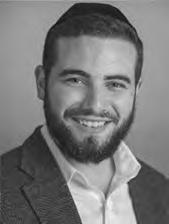
MORDECHAI
GEIGER
Beth Israel
everyone else was crazy. But there is some truth to this. If you think about it, the day you were born was the day G-d decided this world could not be without you. He does not do things by chance or by accident. He does not do unnecessary things. So, if your way of doing things is a little different than everyone else ( hopefully not as distinct as Daniel’s), it’s because that is precisely what the world needs right now. In this week's parsha, G-d counts the Jews and assigns them specific roles based on their tribe. He knew how many of us there were, but He wanted to show us that each of us is unbelievably precious to Him. I think we can all be a little more like Daniel, find our unique talents, and make this world a better place.
Shabbat Shalom.
JACKIE HAJDENBERG
A leading American medical journal praised the Nazi Party’s medical practices in the 1930s and was slow to acknowledge Nazi Germany’s antisemitic abuse, according to a historical retrospective the journal is publishing this week.
The article, which has been published online and will appear in the May 30 print edition of the New England Journal of Medicine, addresses the publication’s history of endorsing Nazi race science.
“We hope it will enable us to learn from our mistakes and prevent new ones,” write authors Joelle M. AbiRached and Allan M. Brandt, both historians of medicine affiliated with Harvard University.
Titled Nazism and the Journal, the article is part of a series written by independent historians that focuses on biases and injustices that NEJM has historically countenanced. Previous entries have addressed eugenics and racism in medicine as well as diversity in medical residency programs.
izenship and prohibited them from marrying non-Jews.
The medical journal did not acknowledge Nazi war crimes until 1944, with the publication of an editorial titled Epidemic Starvation about the dire conditions in concentration camps in Eastern Europe.
“Mass starvation has rarely, if ever, been distributed so ruthlessly or so systematically to civilian populations as has been the case in occupied Europe in the present struggle,” the authors wrote in the 1944 article.

A special exhibit at the United States Holocaust Memorial Museum, Deadly Medicine: Creating the Master Race, explores how the Nazis developed racial health policies that began with the mass sterilization of individuals considered to be biological threats. Credit: United States Holocaust Memorial Museum
The article concludes that the journal “paid only superficial and idiosyncratic attention to the rise of the Nazi state” until the end of World War II, even as competitors dealt forthrightly with the health implications of the Nazis’ persecution of the Jews.
According to the article, NEJM first mentioned Adolf Hitler in a 1935 article by Michael M. Davis, a leading figure in American health policy, and Gertrud Kroeger, a preeminent German nurse who was later revealed to be a Nazi sympathizer. In that article, the two praised the reorganization of national health insurance in Nazi Germany uncritically and in a detached manner, Abi-Rached and Brandt write.
By that time, Jews were already banned from a range of prestigious jobs, including at public universities, and Jewish doctors faced restrictions on their ability to practice medicine.
“There is no reference to the slew of persecutory and antisemitic laws that had been passed after the Nazis assumed power in January 1933,” Abi-Rached and Brandt write. “Davis and Kroeger sympathetically described the requirement that insurance physicians complete 3 months of compulsory service at newly established labor camps in rural areas.”
Abi-Rached and Brandt also found that the Journal “enthusiastically praised German forced sterilization and the restrictive alcohol policies of the Hitler Youth.” A 1934 article about sterilization, titled Sterilization and Its Possible Accomplishments is still available in the journal’s online archive.
The Third Reich had enacted the Law for the Prevention of Offspring with Hereditary Diseases in 1933, requiring the forced sterilization of people with certain mental and physical disabilities. By 1935, the Marital Health Law banned marriages between those deemed “hereditarily healthy” and those who were not — the same year Nazi Germany stripped Jews of cit-
By contrast, Abi-Rached and Brandt found that a competing publication, the Journal of the American Medical Association, or JAMA, “frequently informed its readership about the detrimental impact of Nazi rule on medical practice,” including by “detailing the persecution of Jewish physicians, including the restriction of their practice and access to medical education.”
NEJM only issued one “explicitly critical piece” in 1933 titled The Abuse of the Jewish Physicians, which was a short notice appended to an article about a surgical treatment for tuberculosis.
Abi-Rached and Brandt note that Davis and Kroeger’s article was challenged by a letter to the editor which, they said, “showed sympathy for the Jewish doctors.” (They also note that despite praising Nazi practices, Davis himself had Jewish ancestry.) But the letter in question primarily focused on the threat of socialized medicine. Other articles published in NEJM at the time, they noted, were “overwhelmingly about the compulsory and oversubscribed sickness insurance system, ‘socialized medicine,’ and ‘quackery,’ not the persecution and mass extermination of Jews.”
The publication’s first overt condemnation of the Nazis’ medical abuses did not appear until 1949 after Leo Alexander, a Viennese-born American Jewish psychiatrist and neurologist, compiled evidence to use against Nazi doctors at the Nuremberg trials. Alexander also wrote part of the Nuremberg Code, which provides legal and ethical guidance for scientific experimentation on humans following revelations about Nazi experiments on Jews.
In the 1960s and onward, the New England Journal of Medicine published additional articles documenting the medical atrocities committed by the Nazi medical establishment, as ethical standards became increasingly widespread.
Reflecting on the journal’s omissions during the Holocaust, Abi-Rached and Brandt grasp for explanations and arrive at ones that they say have implications for contemporary scholarship about medicine.
“Part of the answer lies in denial, compartmentalization, and rationalization, all of which depend on structural and institutional racism — deep historical, often unrecognized, bias and discrimination that serve the status quo,” they write.

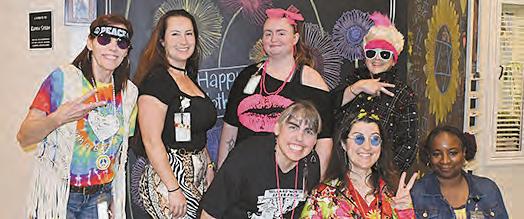
Top, above, right and below: National Skilled Nursing Care Week continues at RBJH. The Residents and staff enjoyed a fun week of dressing up in a theme each day, live music, and Marathon Bingo. We honored staff with an Employee Anniversary Recognition Ceremony. Thank you for the hardworking staff. Five years of service go to Akuto Ayeh, Christina Caniglia, Debbie Chaney, Lanundra Colbert, Low Htoo, Tetyana Leduc, Micael Morris, and Suzy Osborne. For ten years of service, Shamia Hassan and Martha Matthew. Twenty-five years go to Denise Bolan, Thirty to Nancy Joliff, and 35 to Maggie Conti. All staff received an insulated reusable grocery bag, a portable lunch box, and the annual T-shirt that Erin Leutzinger designed. On behalf of the staff at RBJH, we thank the hard-working committee that made all these events happen.
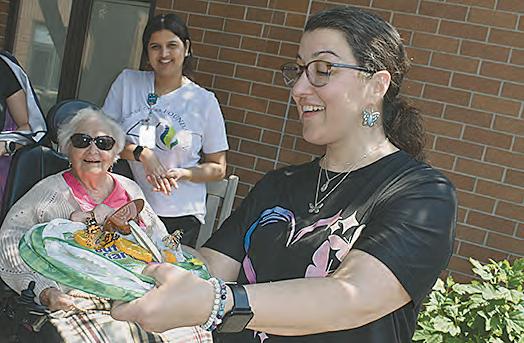


PHOTOS FROM RECENT JEWISH COMMUNITY EVENTS
SUBMIT A PHOTO: Have a photo of a recent Jewish Community event you would like to submit? Email the image and a suggested caption to: avandekamp@jewishomaha.org
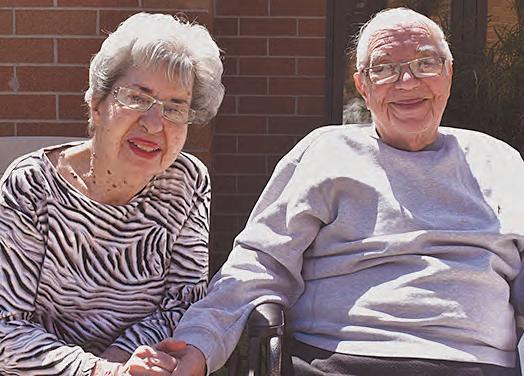
GENEROUSLY SUPPORTED BY



Above, below and bottom: Friedel’s new school garden is really coming together! First and second graders measured landscape mat, cut it to the correct size, and placed our raised bed garden boxes in their spot. Students are filling the boxes and planting the vegetable garden, and kindergarteners planted the herb garden. In addition, Friedel received a plant-grant of 32 pollinator plants to expand our pollinator garden at the front of school. Some landscaping and a privacy fence will be installed over the summer.

Left qnd above: 72 Years: Not Just an Anniversary... A Legacy!

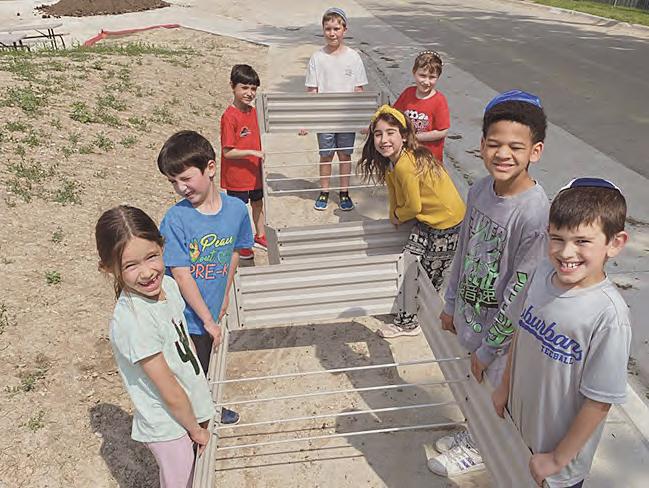




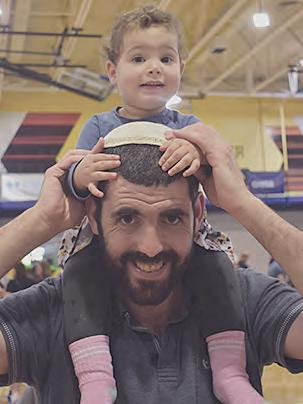
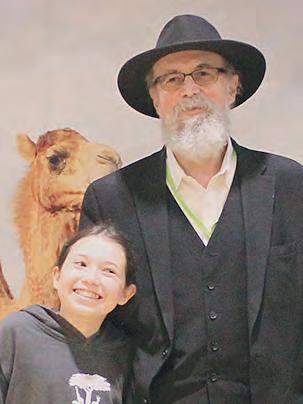

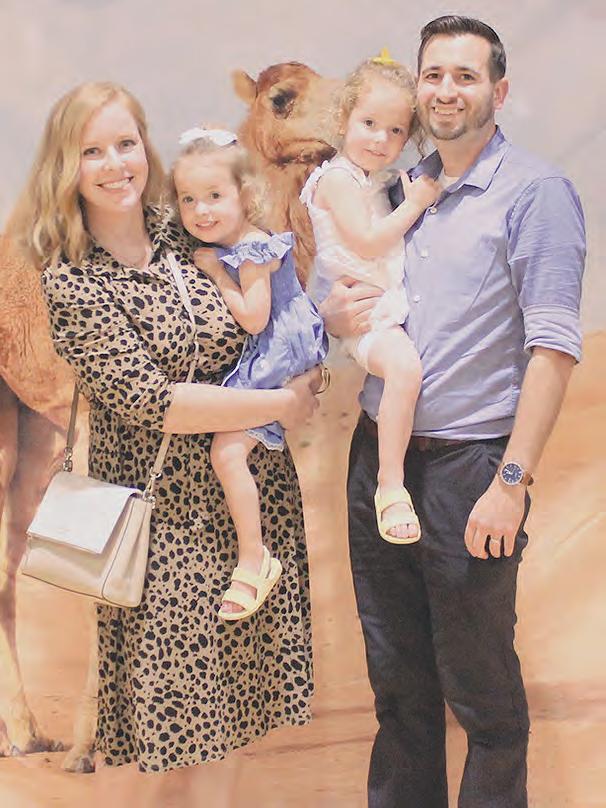
On May 15, our community celebrated Yom Ha’atzmaut, Israeli Independence Day, with food, games, painted faces and an assortment of booths. The Staenberg Omaha JCC Gymnasium was revamped into a market place, where visitors could press their own orange juice, eat falafel, or be photographed in front of the camel backdrop. And, of course, there were balloon animals and inflatables! An official ceremony is held every year on Mount Herzl on the evening of Independence Day. The ceremony includes a speech by the speaker of the Knesset, artistic performances, and the ceremonial lighting of 12 torches, one for each of the tribes. Every year a dozen Israeli citizens, who made a significant social contribution in a selected area, are invited to light the torches. Many cities hold outdoor performances in city squares featuring leading Israeli singers and fireworks displays. Many streets are closed off, so the party can move freely without having to worry about traffic.
The Yom Ha’atzmaut Carnival was sponsored by Anything Grants, funded by the Staenberg Family Foundation, The Chesed Fund (formerly Murray H. and Sharee C. Newman Supporting Foundation), Special Donor Advised Fund, Ruth Frisch & Oscar S. Belzer Endowment Fund of the Jewish Federation of Omaha Foundation, and the Alan J. Levine Program Endowment Fund of the Jewish Federation of Omaha Foundation.




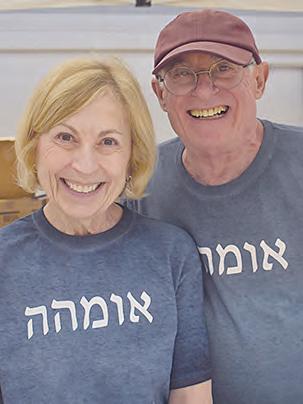




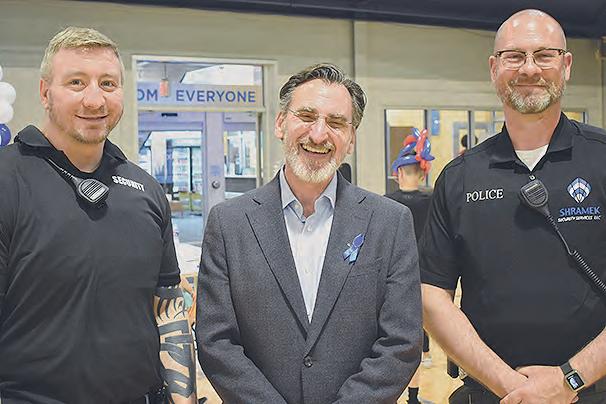

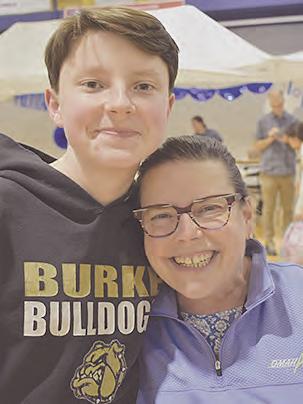
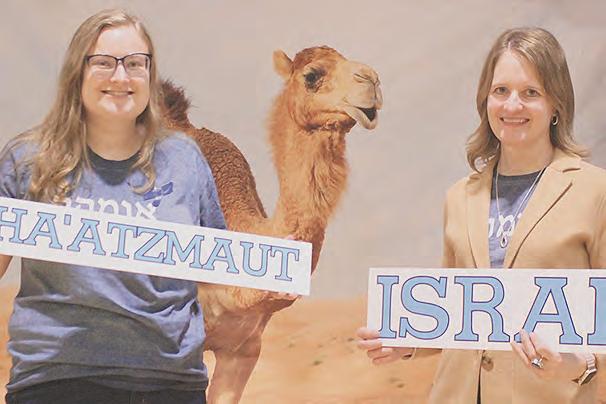
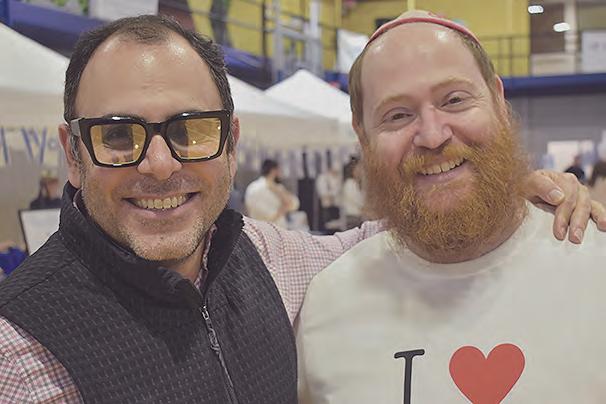




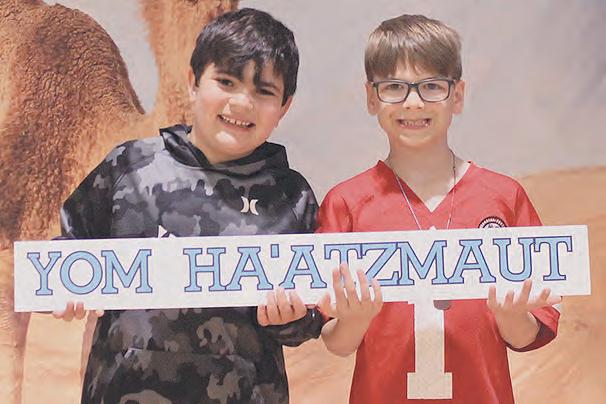
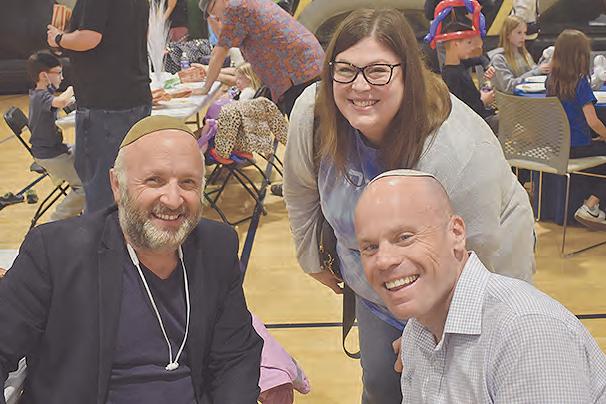
(Founded in 1920)
Margie Gutnik
President
Annette van de Kamp-Wright
Editor
Richard Busse
Creative Director
Howard Kutler
Advertising Executive
Lori Kooper-Schwarz
Assistant Editor
Gabby Blair
Staff Writer
Sam Kricsfeld
Digital support
Mary Bachteler
Accounting
Jewish Press Board
Margie Gutnik, President; Abigail Kutler, Ex-Officio; Helen Epstein; Andrea Erlich; Seth Feldman; David Finkelstein; Ally Freeman; Mary Sue Grossman; Chuck Lucoff; Suzy Sheldon; Joseph Pinson and Larry Ring.
The mission of the Jewish Federation of Omaha is to build and sustain a strong and vibrant Omaha Jewish Community and to support Jews in Israel and around the world. Agencies of the JFO are: Institute for Holocaust Education, Jewish Community Relations Council, Jewish Community Center, Jewish Social Services, Nebraska Jewish Historical Society and the Jewish Press Guidelines and highlights of the Jewish Press, including front page stories and announcements, can be found online at: www.jewishomaha.org; click on ‘Jewish Press.’ Editorials express the view of the writer and are not necessarily representative of the views of the Jewish Press Board of Directors, the Jewish Federation of Omaha Board of Directors, or the Omaha Jewish community as a whole. The Jewish Press reserves the right to edit signed letters and articles for space and content. The Jewish Press is not responsible for the Kashrut of any product or establishment.
Editorial
The Jewish Press is an agency of the Jewish Federation of Omaha. Deadline for copy, ads and photos is: Thursday, 9 a.m., eight days prior to publication. E-mail editorial material and photos to: avandekamp@jewishomaha.org ; send ads (in TIF or PDF format) to: rbusse@jewishomaha.org
Letters to the Editor Guidelines
The Jewish Press welcomes Letters to the Editor. They may be sent via regular mail to: The Jewish Press, 333 So. 132 St., Omaha, NE 68154; via fax: 1.402.334.5422 or via e-mail to the Editor at: avandekamp@jewishomaha.org.
Letters should be no longer than 250 words and must be single-spaced typed, not hand-written. Published letters should be confined to opinions and comments on articles or events. News items should not be submitted and printed as a “Letter to the Editor.”
The Editor may edit letters for content and space restrictions. Letters may be published without giving an opposing view. Information shall be verified before printing. All letters must be signed by the writer. The Jewish Press will not publish letters that appear to be part of an organized campaign, nor letters copied from the Internet. No letters should be published from candidates running for office, but others may write on their behalf.
Letters of thanks should be confined to commending an institution for a program, project or event, rather than personally thanking paid staff, unless the writer chooses to turn the “Letter to the Editor” into a paid personal ad or a news article about the event, project or program which the professional staff supervised. For information, contact Annette van de Kamp-Wright, Jewish Press Editor, 402.334.6450.
Postal
The Jewish Press (USPS 275620) is published weekly (except for the first week of January and July) on Friday for $40 per calendar year U.S.; $80 foreign, by the Jewish Federation of Omaha. Phone: 402.334.6448; FAX: 402.334.5422.
Periodical postage paid at Omaha, NE. POSTMASTER: Send address changes to: The Jewish Press, 333 So. 132 St., Omaha, NE 68154-2198 or email to: jpress@jewishomaha.org
The Wing Luke Museum in Seattle is an Asian American, Native Hawaiian and Pacific Islander heritage museum. It opened a new exhibit titled “Confronting Hate Together” in February of this year.
“The exhibit, cosponsored by Washington state’s Jewish Historical Society and Black Heritage Society,” Andrew Lapin wrote for the Jewish Telegraphic Agency, “is designed to highlight how the different ethnic communities have experienced both historical and contemporary acts of hate.”
All was well, until in early May, no fewer than 26 staffers of the museum walked off the job, because the exhibit includes a panel that states “Today, antisemitism is often disguised as anti-Zionism.”
They then claimed the exhibit “sets a dangerous precedent of platforming colonial, white supremacist perspectives and goes against the Museum’s mission as a community-based museum advancing racial and social equity.”
Let’s unpack this.
The ‘colonial, white supremacist perspective’ refers to us, the Jews, in the diaspora and the State of Israel. We are the white supremacists in this universe.
Breathe.
Ever since October 7, the entire world has been off its axis-and everything we held true is no longer accepted by the majority of people. Nevermind the fact that these 26 staffers walking off the job is in and of itself an act of hate; nobody but us apparently sees it that way.
Editorials express the view of the writer and are not necessarily representative of the views of the Jewish Press Board of Directors, the Jewish Federation of Omaha Board of Directors, or the Omaha Jewish community as a whole.
I wonder if this is what life was like in Europe in the 1930s. Because we watch it happening, and there is very little we can do to stop it. We are at a point in history where being antisemitic is no longer toxic. Sure, if you don a brown shirt, make the nazi salute and wave a swastika flag in a silly parade, people still frown on that. But other than that, antisemitism has become the norm.
I wish I could ask my family members who lived through this already, but my mother is the family matriarch, and she was born in 1943. Why did I not pay more attention when I was younger and more of the survivors were around?
has managed to reinvent itself multiple times throughout history [...] In each iteration, antisemitism reflects the ideological preoccupations of the moment. In antisemitic discourse, Jews are always made to exemplify what a given group of peo-

Because I have questions. These people who hate us so much, have they always secretly felt this way? Were they just waiting for the opportunity? We’ve heard about ‘bystanders,’ but I am now questioning if there really is such a thing. Because if you are a bystander, isn’t that the same as agreeing?
“The superficial sense of security that many Jews feel on a daily basis in the contemporary world turns out to be paper-thin,” Noah Feldman wrote in Time Magazine earlier this year. “Antisemitism
ple considers to be the worst feature of the social order in which they live.”
In order words, nothing ever changes: when the world needs someone to blame, it points at the Jews.
Feldman is not wrong; many of the protests seem to be more anti-Jewish than pro-Palestinian. And I secretly suspect that not everyone protesting knows where to find Gaza on the map. And so my biggest question is: what is it really that they want from us?
In Egypt, a piece of Jewish pottery suggests a woman’s role that was stolen from history
RABBI JILL HAMMER
This story was originally published on My Jewish Learning | JTA
Years ago, my family and I visited the ancient Roman baths for which the city of Bath, England, is known and named. An exhibition there displayed over 100 “curse tablets,” dated from the second to fourth centuries CE, asking for the intervention of the goddess Sulis Minerva to return stolen goods and curse the thieves. I was fascinated by these pleas for divine intervention in a personal loss. Yet I never expected to find a similar prayer formula in an ancient Jewish context halfway across the world.
While the Temple in Jerusalem is the only Jewish temple mentioned in the Bible, there were other Jewish temples, including one in the Egyptian city of Elephantine. Built in the 6th century BCE and destroyed in 410 BCE by priests of the Egyptian god Khnum, the temple was a place where local Jews, often Israelite soldiers hired by Egypt, could offer sacrifices. According to some scholars, the description of the temple at Elephantine is similar to the mishkan, or tabernacle, described in the book of Exodus.
the lion and let him consecrate it….” In this ritual, an individual dedicates a tunic to the temple, thus granting it to the Israelite god. (The “lion” is a term indicating either the deity or a priest.)
In rituals like this, the tunic would be a replica of the stolen one, and God would thus become the
tary text refers to a kahenah, a feminized version of the Hebrew term for priest, kohen. The text found at Elephantine seems to indicate that the biblical norm of having only male priests was not universal. How ironic that the record of a theft might one day allow us to glimpse a woman’s role that was stolen from history.

Excavation work done in 1967 revealed the remains of a Jewish colony centered on a small temple, above, in Elephantine, in what is present-day Aswan, Egypt. Credit: Olaf Tausch/Wikipedia
One of the interesting features of this community, aside from that it performed Jewish sacrifices outside of Jerusalem, is the presence of female functionaries in the temple. One of these, Tamet, was a freed slave who was dedicated as a lachanah, or temple servant. Her husband, Anani son of Azariah, was a lachan, the masculine version of the same term. Both of them lived in a house that shared a wall with the temple.
Israeli archaeologist Gad Barnea has recently translated a fragment from Elephantine, written on a pottery sherd. Barnea has indicated that the text is part of a ritual intended to get vengeance for theft, in a somewhat similar way to the tablets at Bath. The inscription partly reads: “Behold, my tunic, which I left in the house of Yah … command
owner of the stolen property. God would then seek out the thief for punishment. This type of ritual transaction, according to Barnea, occurred throughout the Mediterranean region. The tablets of Bath are simply a slightly different ritual mechanism for a similar purpose: cursing the thief and compelling the return of stolen property. This ritual is not mentioned in the Torah, but the Torah does discuss property, such as fields and livestock (Leviticus 27:28), being dedicated to a sacred shrine.
One of the most fascinating aspects of the Elephantine inscription is that its language suggests a Jewish priestess is conducting this ceremony. She is the one who “commands the lion” to consecrate the tunic, according to Barnea’s reading of the text. Similarly, in the Jewish temple later built in Leontopolis, another ancient Egyptian city, a fragmen-
The religion scholar Bernadette Brooten also reports Jewish gravestones where women are described as priestesses, including one in Leontopolis. It is even possible, as I have been suggesting in my writing elsewhere, that in ancient Israel proper, there may have been women with the title kahenah or kohenet. One of the gifts of this fragment from Elephantine is that it gives us a more diverse picture of who could be a spiritual leader among ancient Israelites, and perhaps might inspire a broader leadership model today. If this priestess is our ritual ancestor, might that affect our understanding of the past and our Jewish practice in the present?
We’ll never know if the Jewish man in Elephantine got his tunic back, or why it was important enough to him that he went to the priestess in the temple. Yet his attempt to make his plight known to God has come down to us, and has alerted us to the existence of a woman who conducted rituals for Egyptian Jews, a reality we might otherwise not have discovered. How extraordinary the mechanisms by which something lost can be found again.
Rabbi Jill Hammer is an author, teacher, midrashist, mystic, poet, essayist and priestess. The views and opinions expressed in this article are those of the author and do not necessarily reflect the views of JTA or its parent company, 70 Faces Media.
I’d mostly forgotten about Ivan Boesky when I heard he died Monday at age 87. But news of his death brought me back to some of my earliest assignments as a Jewish journalist — and how they relate to this week’s controversial Washington Post story about a group of Jewish machers seeking to influence the debate over Israel.
In 1987, Boesky, a high-flying investor with a lifestyle to match, pleaded guilty to insider trading. Not every crime perpetrated by a Jew is a “Jewish story,” but because Boesky was a generous donor to Jewish organizations, Jewish leaders freaked out.
I remember reporting on anguished internal conversations about accepting philanthropy from tarnished donors, but if anything the “external” discourse was even more fraught. In his greed, in his celebration of excess, in his illegal manipulation of the financial system, Boesky — like his erstwhile ally, “junk bond king” turned convicted felon Michael Milken — was an antisemite’s fever dream. Jews braced for a backlash they considered inevitable.
The Boesky scandal also landed just a few years after Jonathan Pollard, a U.S. Navy analyst, was arrested for spying for Israel. Pollard embodied a different category of antisemitic stereotype — “dual loyalty” — which was even more of a threat to the Jews’ sense of security.
Jews watched the horizon for a wave of antisemitism that never came. In May 1987 the American Jewish Committee commissioned a poll asking if Americans thought any less of American Jews as a result of Pollard’s and Boesky’s bad deeds. The answer in both cases turned out to be no. “No more than one percent of the respondents attributed Boesky’s malfeasance to his ‘Jewish background,’” JTA reported at the time. Nevertheless, the Jewish fear of being implicated by the bad behavior of another Jew is persistent, and captured in a famous Yiddish phrase: “a shanda fur die goyim,” or “a shame before the gentiles.” It’s an expression of insecurity, articulating a sense — well founded in history — that the Jews’ precarious status as a minority can be undermined by a homegrown villain or a society looking for scapegoats.
Groups like the Anti-Defamation League often brace for a backlash after high-profile cases of calumny by Jews. When Bernie Madoff admitted in 2008 to masterminding a Ponzi scheme that duped Jewish individuals and organizations, the ADL carefully tracked the antisemitic fallout — even while pointing out that Jews were the victims of Madoff’s scheme and explaining that Madoff represented Madoff, not “the Jews.”
There is at least one significant difference between the Boesky era and the Madoff era: the internet. The ADL tracked dozens of antisemitic comments about Madoff on financial bulletin boards, the comments sections of local and national newspapers and extremist websites — all just coming into their own. If more than 1% of Americans were thinking antisemitic thoughts about Boesky in 1987, it was much harder for them to get the message out.
In the context of 2024 and the Israel-Hamas war, it is almost quaint to consider how a Boesky or a Madoff could send chills down the spines of Jews. In retrospect, the scandals were ripples; the backlash over the war has been a tsunami. It doesn’t
matter if Jews agree or disagree with Israel’s actions: Their Jewishness makes them targets of the current backlash. On college campuses, in progressive circles, in literary and artistic settings, they are being isolated and excluded for showing a hint of empathy for or attachment to a Jewish state. Jewish and Middle Eastern restaurants and other ostensibly “Zionist” places have been targeted by protesters and vandals. Synagogues have received bomb threats. Jewish musicians have had their concerts cancelled. Pro-Palestinian demonstrators protested at the opening of a Holocaust museum in the Netherlands.
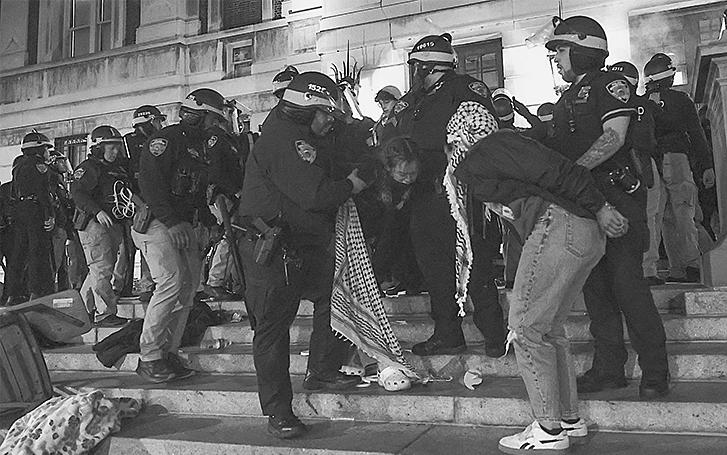
It is in the context of this barrage of anti-Jewish scapegoating that the ADL bashed the Washington Post for an article last week on a group of pro-Israel “billionaires and business titans working to shape U.S. public opinion of the war in Gaza.”
The article reports on a WhatsApp group chat in which the “titans” appear to arrange for the screening of Israeli government films documenting Hamas’ Oct. 7 attack on Israel, and strategize how to use campaign contributions to reward pro-Israel politicians. The article also cites sources and WhatsApp messages to report on a Zoom chat between members of the group and NYC Mayor Eric Adams, urging the mayor to send cops to clamp down on the pro-Palestinian encampment at Columbia University. Some members even offered to “pay for private investigators to assist New York police in handling the protests.”
The ADL tweeted that the newspaper “should be ashamed of publishing an article that unabashedly (and almost entirely on anonymous sources) plays into antisemitic tropes by inferring a secret cabal of Jews is using wealth & power to influence governments, the media, the business world & academia.”
This came after Fabien Levy, Adams’ deputy mayor for communications, said that he was “shocked” by the Post story. “The insinuation that Jewish donors secretly plotted to influence government operations is an all too familiar antisemitic trope,” Levy, who is Jewish, said in a post on X.
Levy also notes in the story that when the NYPD twice entered Columbia’s campus to disperse protesters, it was in response to “specific written requests” from university leadership, including the school’s Muslim president, Minouche Shafik.
The story appears to go out of its way not to describe the group’s members as Jewish, although all of the members it names — including “Kind snack company founder Daniel Lubetzky, hedge fund manager Daniel Loeb, billionaire Len Blavatnik and real estate investor Joseph Sitt” — are. Yet it abounds in the kind of language about power, finance and collusive influence that triggers Jews sensitive to antisemitism: The group “privately pressed” Adams (as opposed to what?); the group’s activism “has stretched beyond New York, touching the highest levels of the Israeli government, the U.S. business world and elite universities”; members of the group “wielded their money and power in an effort to shape American views of the Gaza war, as well as the actions of academic, business and political leaders — including New York’s mayor.”
On the other hand, the challenge for the ADL and other watchdogs is to explain why a report on Jewish and pro-Israel political influence is prima facie antisemitic when Jewish mainstream groups like the American Israel Public Affairs Committee are organized specifically — and proudly — to assert just that influence. More than one X user tweeted back at the ADL that “the truth can’t be antisemitic.”
Except when it can. As the story moved downstream, it fueled the kind of gleeful commentary that can often seem indistinguishable from antisemitism. The New York news site Hellgate asked, “Who should have a voice in deciding [emphasis added] whether” the NYPD should be deployed in breaking up a campus protest?
It’s a good question if the subject is campaign financing and how money and connections subvert the political system. It’s a more loaded question when it suggests that there is something “remarkable” about a group of deep-pocketed lobbyists donors seeking to influence elected officials.
You can also read the WaPo story the way many Jews read about the Boesky and Madoff affairs, and direct your ire at the Jews who reinforced antisemitic tropes through their illegal or, perhaps in this case, ill-advised behavior. Of course, that raises the question: Should influential Jews not lobby for their shared interests, lest it be seen as reinforcing anti-Jewish stereotypes?
To be a Jew has always meant to be on guard against shande and brace for the antisemitic backlash. It’s a measure of the super-heated atmosphere since Oct. 7 that it also means guarding against behaviors that in another time would have been considered legal, conventional and uncontroversial. In New York last week, a theater canceled a play with Holocaust themes, according to the Dramatists Legal Defense Fund, because of security concerns raised by its insurance company. If Jews seem a little defensive, you might blame backlash fatigue.
Andrew Silow-Carroll is editor at large of the New York Jewish Week and managing editor for Ideas for the Jewish Telegraphic Agency.
The views and opinions expressed in this article are those of the author and do not necessarily reflect the views of JTA or its parent company, 70 Faces Media.
BEN SALES
JTA
Israelis have long taken pride in two things: the long arc of Jewish history, and their relentlessly dark humor in the face of unspeakable tragedy.
For about a decade, the synthesis of those two qualities has been The Jews Are Coming, a sketch comedy show now in its sixth season on Kan, Israel’s public broadcaster.
Nearly every sketch in the show satirizes an event from millennia’s worth of Jewish and Israeli religious texts and history. Its guiding principle is irreverence.
So the show’s catalog includes spoofs of the story of Purim and the invention of the mezuzah, but it also features joke after joke about the Nazis, the Spanish Inquisition, the Yom Kippur War, the destruction of the Second Temple in ancient times and any number of other lachrymose episodes of the Jewish past. In the opening credits and between sketches, the show displays the tools used in a ritual circumcision.
So after Oct. 7, the program confronted a question: What to do when the tragedy isn’t historical but current and — for many Israelis — ongoing?
Recently, we got our answer: In unprecedented times, The Jews Are Coming did something unprecedented: It got serious. In two segments posted online over the past week, which opened and closed out a recent episode, the comedy show hardly aimed to elicit any laughs, but gave viewers a window into where Israelis’ heads are at more than seven months after Oct. 7.
Both sketches take place in what look like typical The Jews Are Coming settings. In the opening video, the biblical Moses, a recurring character on the show, praises Israelis for their spirit of generosity after the attack.
“I saw how you’re volunteering, how you’re hosting guests, how you pile into vans to go and cheer up evacuees, or to dance with soldiers, to bring some happiness to this sad time,” he says. “You really surprised me. You’re a great nation, and you deserve to hear it.”
The closing video begins with Yael Sharoni, one of the show’s actors, dressed in robes indicating ancient times in front of what looks like a wall from the Old City of Jerusalem. Text on screen reads, “Jerusalem, 70 CE.”
“It was the morning of the ninth of Av,” she begins, looking troubled, in a reference to the day when the Second Temple was destroyed by the Roman Empire. “We were awakened by a terrifying noise. We didn’t know what was happening, until we understood that the Romans had started burning the temple.”
Second later, looking terrified, Sharoni’s character says, “Then we heard shrieking from the house next door.”
The scene shifts to a man in medieval garb, from Cologne in 1096, during the crusades, who picks up the narrative where Sharoni’s character left off. He is followed by Jewish survivors of the 1903 Kishinev pogrom, the 1929 Hebron massacre, Kristallnacht in 1938 and the Farhud, an antisemitic pogrom in Baghdad. Each describes witnessing the murder of Jews and their own fears of their families getting killed by violent antisemites.
Finally, the narrative shifts to a woman in contemporary clothes and full color, alongside the text, “Kfar Aza, 2023.” The community was one of the sites hit hardest by the Oct. 7 attack.
“Everyone asks if we can go on living with this,” she says.
“We have no choice. We must carry on, step by step, and start rebuilding from scratch.”
The message is clear: With global attention increasingly turned to devastation in Gaza, the video relays the Israeli perspective that Hamas’ attack — which killed approximately 1,200 people, destroyed Israeli communities and took some 250 people hostage — is just the latest in a long line of antisemitic massacres that the Jews have overcome. It also reflects that Israelis’ focus remains on the tragedy of the Hamas attack and its aftermath rather than on the tens of thousands of Palestinian casualties.
Both videos are directed at an Israeli audience as well as a global one. And both, aiming for a unifying tone, come from a show that has divided Israelis in the past.
The show’s creators appear wise to the fact that messages of shared destiny may ring hollow at a time when their country is both deeply traumatized and deeply divided. In the Moses segment, he cautions Israelis not to yield to the forces pulling them apart. “Remember what you’ve been like in this time, without fighting or shouting or civil wars. And decide what kind of generation you want to be: a generation that destroys or a generation that builds. The future generations of the Jewish people are watching you now,” he says.
Read more ate www.omahajewishpress.com.
B’NAI ISRAEL
SYNAGOGUE
618 Mynster Street Council Bluffs, IA 51503-0766
712.322.4705 www.cblhs.org
BETH EL SYNAGOGUE
Member of United Synagogues of Conservative Judaism 14506 California Street Omaha, NE 68154-1980
402.492.8550 bethel-omaha.org
BETH ISRAEL
SYNAGOGUE
Member of Union of Orthodox Jewish Congregations of America 12604 Pacific Street Omaha, NE. 68154
402.556.6288 BethIsrael@OrthodoxOmaha.org
CHABAD HOUSE
An Affiliate of Chabad-Lubavitch 1866 South 120 Street Omaha, NE 68144-1646
402.330.1800 OChabad.com email: chabad@aol.com
LINCOLN JEWISH COMMUNITY:
B’NAI JESHURUN
South Street Temple Union for Reform Judaism 2061 South 20th Street Lincoln, NE 68502-2797
402.435.8004 www.southstreettemple.org
OFFUTT AIR
FORCE BASE
Capehart Chapel 2500 Capehart Road Offutt AFB, NE 68123
402.294.6244 email: oafbjsll@icloud.com
ROSE BLUMKIN
JEWISH HOME
323 South 132 Street Omaha, NE 68154
TEMPLE ISRAEL
Union for Reform Judaism (URJ) 13111 Sterling Ridge Drive Omaha, NE 68144-1206
402.556.6536 templeisraelomaha.com
LINCOLN JEWISH COMMUNITY:
TIFERETH ISRAEL
Member of United Synagogue of Conservative Judaism 3219 Sheridan Boulevard Lincoln, NE 68502-5236
402.423.8569 tiferethisraellincoln.org
Monthly Speaker Series Service, Friday, June 14, 7:30 p.m. with our Bob Yaffe, he will discuss his book Relinquished. Our service leader is Larry Blass. Everyone is always welcome at B’nai Israel!
For information about our historic synagogue, please visit our website at www.cblhs.org or contact any of our other board members: Renee Corcoran, Scott Friedman, Rick Katelman, Janie Kulakofsky, Howard Kutler, Carole and Wayne Lainof, Ann Moshman, MaryBeth Muskin, Debbie Salomon and Sissy Silber. Handicap Accessible.
Services conducted by Rabbi Steven Abraham and Hazzan Michael Krausman.
IN-PERSON AND ZOOM MINYAN SCHEDULE:
Mornings on Sundays, 9 a.m.; Mondays and Thursdays, 7 a.m.; Evenings on Sunday-Thursday, 5:30 p.m.
FRIDAY: Pre-Neg, 5:30 p.m. with Rabbi Telushkin; Kabbalat Shabbat 6 p.m. with Rabbi Telushkin at Beth El & Live Stream.
SATURDAY: Shabbat Morning Service 10 a.m. at Beth El & Live Stream; Havdalah, 9:40 p.m. Zoom only.
SUNDAY: Morning Minyan, 9 a.m. Zoom Only.
MONDAY: Women’s Book Group, 6:30 p.m. Zoom Only.
TUESDAY: Tikkun Leil Shavout with Temple Israel 6:30 p.m. at Beth El & Live Stream.
WEDNESDAY: Shavout Festival Morning Service, 10 a.m. dairy lunch to follow at Beth El & Live Stream; Beth El Office Closed.
THURSDAY: Shavout Festival Morning Service with Yizkor, 10 a.m. dairy lunch to follow at Beth El & Live Stream; Beth El Office Closed.
FRIDAY-June 14: Kabbalat Shabbat 6 p.m. at Beth El & Live Stream.
SATURDAY-June 15: Shabbat Morning Service 10 a.m. at Beth El & Live Stream followed by Kiddush Lunch in honor of Joan Latchaw’s 80th Birthday; Havdalah 9:45 p.m. Zoom only.
Please visit bethel-omaha.org for additional information and service links.
FRIDAY: Nach Yomi, 6:45 a.m.; Shacharit, 7 a.m.; Mincha/Kabbalat Shabbat, 7 p.m.; Candlelighting, 8:38 p.m.
SATURDAY: Shabbat Kollel, 8:30 a.m.; Shacharit, 9 a.m.; Tot Shabbat 10:30 a.m.; Youth Class 10:45 a.m.; Tehillim, 7:15 p.m. at the Uzi’s; Soulful Torah, 7:45 p.m. with Rabbi Geiger; Mincha, 8:30 p.m.; Laws of Shabbos/Kids Activity 9 p.m.; Havdalah, 9:47 p.m.
SUNDAY: Shacharit, 9 a.m.; Kinyan, 9:40 a.m.; Mincha/Ma’ariv, 8:30 p.m.
MONDAY: Nach Yomi, 6:45 a.m.; Shacharit, 7 a.m.; Mincha/Ma’ariv, 8:30 p.m.
TUESDAY: Nach Yomi, 6:45 a.m.; Shacharit, 7 a.m.; Kinyan 8 p.m.; Mincha/Ma’ariv/Candlelighting, 8:30 p.m.; Shavout Dinner, 10 p.m.
WEDNESDAY: Shacharit, 9 a.m.; Mincha/Ma’ariv, 8:30 p.m.; Candlelighting, 9:40 p.m.
THURSDAY: Shacharit, 9 a.m.; Yizkor, 10:30 a.m.; Mincha/Ma’ariv, 8:30 p.m.; Havdalah, 9:50 p.m.
FRIDAY-June 14: Nach Yomi, 6:45 a.m.; Shacharit, 7 a.m.; Mincha/Kabbalat Shabbat, 7 p.m.; Candlelighting, 8:41 p.m.
SATURDAY-June 15: Shabbat Kollel, 8:30 a.m.; Shacharit 9 a.m.; Tot Shabbat 10:30 a.m.; Youth Class, 10:45 a.m.; Tehillim, 7:15 p.m. at the Uzi’s; Soulful Torah, 7:45 p.m. with Rabbi Geiger; Mincha 8:30 p.m.; Laws of Shabbos/Kids Activity, 9 p.m.; Havdalah, 9:51 p.m.
Please visit orthodoxomaha.org for additional information and Zoom service links.
All services are in-person. All classes are being offered in-person and via Zoom (ochabad.com/academy). For more information or to request help, please visit www.ochabad.com or call the office at 402.330.1800.
FRIDAY: Shacharit 8 a.m.; Inspirational Lechayim, 5:45 p.m. with Rabbi and friends: Ochabad.com/ Lechayim; Candlelighting, 8:37 p.m.
SATURDAY: Shacharit 9:30 a.m. followed by Kiddush and Cholent; Shabbat Ends, 9:47 p.m.
SUNDAY: Sunday Morning Wraps: Shacharit, 99:30 a.m., Video Presentation, 9:30 a.m. and Breakfast, 9:45 a.m.; Torah and Tea, 10:30-11:15 a.m.
MONDAY: Shacharit 8 a.m.; Personal Parsha, 9:30 a.m.; Intermediate Biblical Hebrew Grammar, 10:30 a.m. with Prof. David Cohen; Parsha Reading, 6 p.m. with Prof. David Cohen.
TUESDAY: Shacharit, 8 a.m.; Ten Commandments, 11 a.m.; Garden Party, 11:30 a.m.; Pancake Famiy Dinner, 5:30 p.m.
WEDNESDAY: Shacharit, 8 a.m
THURSDAY: Shacharit 8 a.m.
FRIDAY-June 14: Shacharit 8 a.m.; Inspirational Lechayim, 5:45 p.m. with Rabbi and friends: Ochaba d.com/Lechayim; Candlelighting, 8:41 p.m.
SATURDAY-June 15: Shacharit, 9:30 a.m. followed by Kiddush and Cholent; Shabbat Ends, 9:50 p.m.
Services facilitated by Rabbi Alex Felch. All services offered in-person with live-stream or teleconferencing options.
FRIDAY: Star City Pride Festival, 4-9 p.m. at the outdoor festival space in the Haymarket; Erev Shabbat Service with Rabbi Alex, 6:30-7:30 p.m. at SST; Shabbat Candlelighting, 8:38 p.m.
SATURDAY: Shabbat Morning Service, 9:30-11 a.m. at TI; Torah Study noon on Parashat Bamidbar via Zoom; Star City Pride Festival, noon-9 p.m. at the outdoor festival space in the Haymarket; Havdalah, 9:47 p.m.
SUNDAY: Joint Board Meeting, 10:30 a.m.; Men’s Bike/Coffee Group, 10:30 a.m. in the Conference Room at Rock 'n Joe (5025 Lindbergh St.). For more information or questions please email Al Weiss at alb ertw801@gmail.com; Pickleball, 3-5 p.m. Anyone interested in playing or learning how to play can text
Miriam at 402.470.2393. If there are enough interested people; we will play in the Social Hall at TI.
WEDNESDAY: Synagogue Offices Closed.
THURSDAY: Synagogue Offices Closed.
FRIDAY-June 14: Erev Shabbat Service with Rabbi Alex, 6:30-7:30 p.m. at SST; Shabbat Candlelighting, 8:41 p.m.
SATURDAY-June 15: Shabbat Morning Service, 9:30-11 a.m. at TI; Torah Study noon on Parashat Naso via Zoom; Potluck Dinner and Family Game Night, 6 p.m. at SST. Adults and kids of all ages are welcome. Please bring a dish to share; Havdalah, 9:51 p.m.
FRIDAYS: Virtual Shabbat Service, 7:30 p.m. every first and third of the month at Capehart Chapel. Contact TSgt Jason Rife at OAFBJSLL@icloud.com for more information.
The Rose Blumkin Jewish Home’s service is currently closed to visitors.
In-person and virtual services conducted by Rabbi Benjamin Sharff, Rabbi Deana Sussman Berezin, and Cantor Joanna Alexander
FRIDAY: Drop in Mah Jongg, 9-11 a.m. In-Person; Shabbat B’yachad Service, 6 p.m. In-Person & Zoom.
SATURDAY: Torah Study, 9:15 a.m. In-Person & Zoom; Shabbat Morning Service, 10:30 a.m. In-Person & Zoom; Movie Night for 20 Somethings, 7 p.m. In-Person.
TUESDAY: Tikkun Leil Shavout (Evening of Study), 6:30 p.m. at Beth El In-Person.
WEDNESDAY: Shavuot Service and Yizkor, 10:30 a.m. In-Person.
FRIDAY-June 14: Drop in Mah Jongg, 9-11 a.m. InPerson; Shabbat Shira Service, 6 p.m. In-Person & Zoom.
SATURDAY-June 15: Torah Study, 9:15 a.m. In-Person & Zoom; Shabbat Morning Service, 10:30 a.m. InPerson & Zoom.
Please visit templeisraelomaha.com for additional information and Zoom service links.
Announcements may be e-mailed to the Press at jpress@jewishomaha.org; or mailed to 333 So. 132 St., Omaha, NE 68154. Readers can also submit announcements -- births, b’nai mitzvahs, engagements, marriages, commitment ceremonies or obituaries -- online at www.omahajewish press.com/site/forms/. Deadlines are normally nine days prior to publication, on Wednesdays, 9 a.m. Please check the Jewish Press, for notices of early deadlines.
Spain, Norway and Ireland said May 22 they would formally recognize a Palestinian state, a sign of Israel’s challenges on the global stage.
The countries portrayed the step as an attempt to salvage long-dormant prospects for progress toward a two-state solution, creating a Palestinian state alongside Israel. Israel castigated the move as a reward for Hamas’ Oct. 7 attack, which launched the current war.
“Last month I stood on these same steps with Prime Minister Sanchez of Spain, and we said that the point of recognizing the state of Palestine was coming closer,” Irish Prime Minister Simon Harris said in Dublin. “That point has now arrived.”
He said it was “an historic and important day for Ireland and Palestine,” adding that the recognition has come “because we believe in freedom and justice as the fundamental principles of international law and because we believe that permanent peace can only be secured on the basis of the free will of a free people.”
The three countries’ coordinated announcements underscore the degree to which the international community has lost patience with Israel amid its war against Hamas in Gaza, now in its eighth month.
Recognition of a Palestinian state is a symbolic step with no immediate material impact for Palestinians living in Gaza and the West Bank. But it represents a sharp rebuke to Israel, whose current government opposes Palestinian statehood and which has long held that a diplomatic resolution to the conflict should come only via negotiations.
Israel swiftly condemned the announcements and recalled its ambassadors from Ireland and Norway on May 22. Its far-right finance minister, Bezalel Smotrich, called for settlement expansion in the West Bank as well as the withholding of Palestinian tax revenue paid via Israel.
Although 140 countries already recognize Palestine as a sovereign state, most Western European countries have avoided the move until now. Harris said he was “confident” that more countries would recognize Palestine in the coming weeks.
Spain, Norway and Ireland all said their official recognition would go into effect on May 28.
Norway was the first to make its announcement, carrying a particular symbolism because of its role in hosting the 1993 Oslo Accords, a framework for peace that placed Palestinian population centers under limited Palestinian rule, but ultimately failed to end the decades-long conflict and the Israeli occupation of the West Bank and Gaza.
Spanish Prime Minister Pedro Sánchez, who has been harshly critical of Israel’s war in Gaza, pointed to Israel’s lack of a peace plan with the Palestinians as driving his decision, saying, “The two-state solution is in danger.” In April, Sanchez visited with both Harris and Støre as part of a European tour aiming to drum up support for recognizing Palestine; he also met with leaders in Belgium and Slovenia at the time.
Although the United States has not unilaterally endorsed an independent Palestinian state, its official policy includes commitment to a two-state solution. No serious peace negotiations have taken place in more than a decade.
LAUREN DANIELLE HERSCH
Samantha and Daniel Hersch of Edina, MN, announce the May 30, 2024 birth of their daughter, Lauren Danielle. She has a brother, Charlie Hersch.
Grandparents are Donna and Alan Hersch of Omaha, and Michelle and Steven Shaller, Sunfish Lake, MN.
Great-grandparents are Rossy Shaller of Mendota Heights, MN, and Shirley Held of St. Louis Park, MN.
LYNN
Lynn D. Saunders, a teacher, artist, and beloved sister and aunt, passed away unexpectedly on May 25, 2024.
She is survived by her brother, Mark Samuel, and sister, Paula Saunders, and three nieces.
Lynn was born in Omaha in 1946, she spent 40 years as a classroom teacher and school librarian in Washington, D.C., and Omaha public schools.
Lynn was passionate about her poodles, Beau, Kelly, Willie, Hank, Casey and Ty, loved books of all genres, and was a natural artist in the garden and studio. She shared her artistic talents in fiber art compositions and the creative holiday and birthday cards she showered on family and friends.
Announcements may be e-mailed to the Press at jpress @jewishomaha.org; or mailed to 333 So. 132 St., Omaha, NE 68154. Readers can also submit announcements -- births, b’nai mitzvahs, engagements, marriages, commitment ceremonies or obituaries -- online at www.omahajewishpress. com/site/forms/. Deadlines are normally nine days prior to publication, on Wednesdays, 9 a.m. Please check the Jewish Press, for notices of early deadlines.

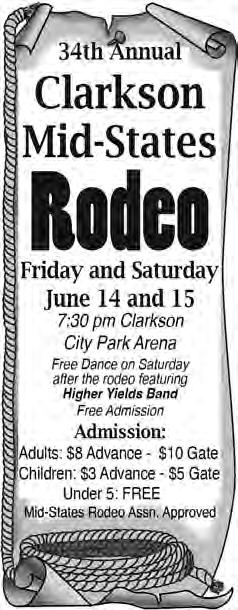






CLASSIFIED ADVERTISING works! Place your 25 word ad into thousands of Nebraska homes for $225. Contact the Jewish Press or call 1-800-369-2850.
HELLO NEBRASKA! Introducing www.nepublicnotices.com, a new public notice website presented as a public service by all Nebraska newspapers. Free access, fully searchable – because democracy depends upon open government and your right to know.
AFFORDABLE PRESS Release service. Send your message to 155 newspapers across Nebraska for one low price! Call 1-800369-2850 or www.nebpress.com for more details.
SAFE STEP. North America s #1 Walk-In Tub. Comprehensive lifetime warranty. Top-of-the-line installation and service. Now featuring our FREE shower package and $1600 Off for a limited time! Call today! Financing available. Call Safe Step 1-877-9330188.
PORTABLE OXYGEN Concentrator? May be covered by Medicare! Reclaim independence and mobility with the compact design and long-lasting battery of Inogen One. Free information kit! Call 855-385-3580.
DOES YOUR basement or crawl space need some attention? Call Thrasher Foundation Repair! A permanent solution for waterproofing, failing foundations, sinking concrete and nasty crawl spaces. FREE Inspection & Same Day Estimate. $250 off ANY project with code GET250. Call 1-844-958-3431.
ELIMINATE GUTTER cleaning forever! LeafFilter, the most advanced debris-blocking gutter protection. Schedule a FREE LeafFilter estimate today. 20% off Entire Purchase. Plus 10% Senior & Military Discounts. Call 1-855-671-2859.
HOUSE FOR SALE
BEAUTIFUL LAKE Home on Harlan County Reservoir! Updated top to bottom. 4 bedrooms. 3 1/2 bathrooms. Several outbuildings. Only 150 yards from the lake. 70747 Lake View Ct, Republican City, NE. Check it out: myclearviewrealty.com
PETS/LIVESTOCK WHEN VETERINARY care is unavailable or unaffordable, ask for Happy Jack® animal healthcare products for cats, dogs, & horses. At Tractor Supply®. (www.happyjackinc.com).
Toby Klein successfully navigated coming out as gay to her Orthodox community, chose to do her doctorate researching Holocaust education at the University of Arkansas and spent time doing abortion advocacy work in the conservative southern state before becoming program manager for the Jewish LGBTQ+ advocacy organization A Wider Bridge.
But Klein’s work advocating for Israel since Oct. 7 has made her stand out like never before. It has earned her opprobrium from LGBTQ+ activists she thought were her friends and praise from Zionists.
Klein was recently named by Hadassah, The Women’s Zionist Organization of America, to its second annual list of 18 American Zionist Women You Should Know. Hadassah’s 2024 list includes both wellknown names and lesser-known ones.
work and accomplishing so much.”
With almost 300,000 members, Hadassah aims to elevate the profiles of the women on the list and help their Zionist messages – and the larger message that Zionism today constitutes a diverse array of identities and activities – reach a much wider audience.

Among the honorees are actress Debra Messing, who has used her public platform to speak out about the post-Oct. 7 explosion in antisemitism; poet Tova Ricardo; social media influencer Shai Albrecht; Christian Zionist activist Destiny Albritton; Hillels of Illinois executive director and JUF campus affairs associate vice president Emily Briskman; and Gila Zarbiv, a nurse midwife at Hadassah’s medical center in Jerusalem who lectures internationally on the complexities of life, birth and medicine in Israel.
Many have intensified their outspokenness in support of Israel in the wake of Oct. 7, taking risks to push back against lies and hate directed toward Israel and Jews.
“I’m so proud of the women on this list,” said Hadassah National President Carol Ann Schwartz. “They are doing so much
“They are not people looking to start a fight, but people who are educating, correcting misinformation, and getting the facts out there in a positive way,” Schwartz said. Publication of the list is one of several initiatives Hadassah has undertaken since Oct. 7. The organization has also sent two global solidarity missions to Israel during which the groups met with hostage families, among other activities. Hadassah also expedited the opening of a new rehabilitation center at its Mount Scopus hospital so that injured soldiers would have access to the state-of-theart facilities they need to recover.
Perhaps the biggest project Hadassah has undertaken since Oct. 7 is its global End The Silence campaign to raise awareness of Hamas’ weaponization of sexual violence and to demand that the United Nations hold Hamas accountable. Central to the campaign is an international petition that, to date, has been signed by more than 150,000 people in 118 countries and shared with the UN.
Valeria Chazin’s work as a campus advocate for Israel landed her a spot on Hadassah’s 2024 list. The organization Chazin founded 12 years ago while a senior in college, Students Supporting Israel, now has over 200 chapters worldwide.
“Twelve years ago, we already saw that there was a major problem with propaganda and an anti-Israel atmosphere on campuses, and Zionist students were afraid to speak their
minds,” Chazin said. “At first, we were a local initiative on our campus in Minnesota. But we quickly realized that students everywhere need this support.”
Chazin, who was born in Kiev but moved to Israel and served in the Israel Defense Forces, said she tries to inspire students to be visibly pro-Israel on campus. The pro-Israel events her organization holds often take place in the center of campus, and she encourages Zionist students to get into student government in order to increase their impact.
Having been involved in pro-Israel activism on campus for over a decade, Chazin said she hasn’t been surprised by the proliferation of anti-Israel messages on campus.
“But what has been absolutely shocking is the intensity of it, the hate, the number of people joining, and the openly antisemitic messages displayed on campuses,” she said. “It’s absolutely horrific.”
Also on the list are LA-based writer Eve Barlow, whose social media posts about antisemitism and anti-Zionism reach over 1.5 million people; law student Adela Cojab-Moadeb, who filed a successful federal civil rights lawsuit against New York University for failing to protect Jews on campus from harassment; former Hungarian diplomat Virag Gulyas, a non-Jew who writes the popular blog The Almost Jewish; director of Israel engagement for the Jewish Federation of Greater Atlanta Jenn Handel; Aviva Klompas, CEO of Boundless, which addresses the challenges involved in working to combat antisemitism; Hadassah volunteer leader and Israel advocate Luisa Narins; Michelle Rojas-Tal, a trailblazer in helping young Jews navigate difficult conversations about Zionism and Israel; international speaker Ashira Solomon, who advocates for a secure future for Israel and speaks out against antisemitism in the African-American community; and scholar Samantha von Ende, an expert in modern antisemitism, Zionism and the Israeli political system.
Read more at www.omahajewishpress.com.

